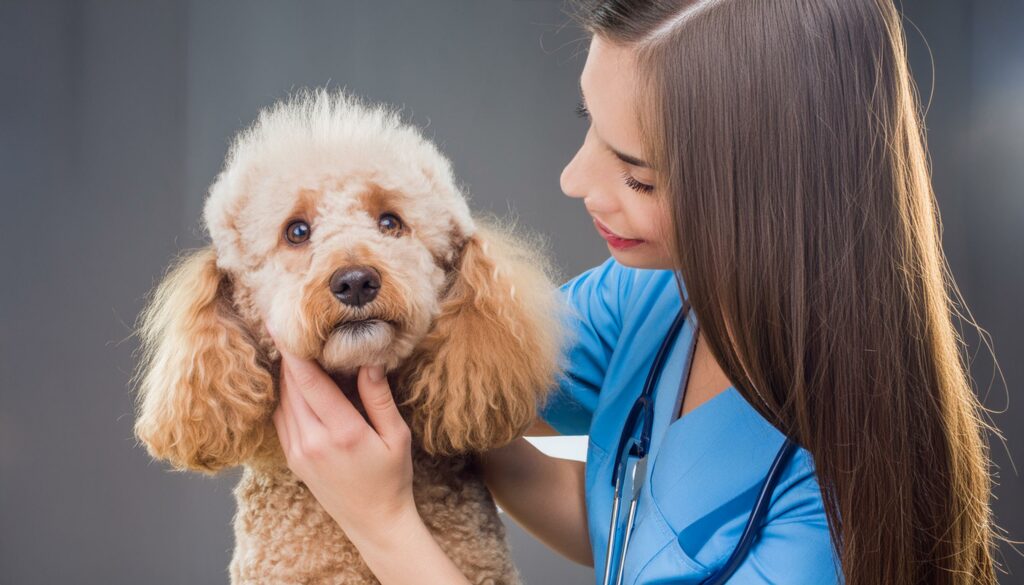Poodles, known for their intelligence and elegance, are susceptible to various health issues. Responsible pet ownership involves understanding and addressing these potential problems to ensure the well-being of these beloved companions.
Common Health Problems in Poodles
Genetic Health Issues
Genetic health issues are prevalent in Poodles due to their breeding history. These may encompass heart diseases, neurological disorders, and blood disorders. While responsible breeding practices can mitigate these risks, prospective owners should be aware of the potential for genetic ailments.
Hip Dysplasia
Hip dysplasia is a common orthopedic issue in Poodles. This condition occurs when the hip joint doesn’t develop properly, resulting in discomfort and reduced mobility. Owners can take preventive measures such as providing regular exercise, maintaining a healthy weight, and ensuring proper nutrition to reduce the risk of hip dysplasia.
Epilepsy
Epilepsy, characterized by seizures, can affect Poodles. While the exact cause is often unknown, medication and management strategies can help control seizures and improve the quality of life for affected dogs. Regular veterinary care is essential for monitoring and adjusting treatment as needed.
Progressive Retinal Atrophy (PRA)
Progressive Retinal Atrophy (PRA) is a group of genetic diseases that cause the retina to degenerate over time, eventually leading to blindness. Poodles, particularly Toy and Miniature varieties, are predisposed to this condition. Regular veterinary check-ups and genetic testing can aid in early detection and intervention to slow the progression of PRA.
Hypothyroidism
Hypothyroidism occurs when the thyroid gland doesn’t produce enough hormones, leading to a range of symptoms including weight gain, lethargy, and skin issues. Poodles are among the breeds prone to this condition. Treatment typically involves hormone replacement therapy and dietary management under the guidance of a veterinarian.
Skin and Allergy Issues
Atopic Dermatitis
Atopic dermatitis is a common allergic skin disease in Poodles, characterized by itching, redness, and inflammation. Environmental allergens such as pollen, dust mites, and mold can trigger flare-ups. Management strategies may include identifying and avoiding allergens, topical treatments, and medications prescribed by a veterinarian.
Sebaceous Adenitis
Sebaceous adenitis is a hereditary skin condition that affects the sebaceous glands, leading to dry, scaly skin and hair loss. While there is no cure, regular grooming with moisturizing shampoos and supplements can help alleviate symptoms and maintain skin health.
Food Allergies
Poodles may develop food allergies, resulting in digestive issues, skin problems, and ear infections. Common allergens include beef, chicken, dairy, and grains. Switching to a hypoallergenic diet recommended by a veterinarian can often resolve these issues and improve the dog’s overall well-being.
Orthopedic Problems

Luxating Patella
Luxating patella, or a dislocated kneecap, is common in smaller Poodle varieties. This condition can cause pain and lameness, particularly in severe cases. Treatment options range from weight management and physical therapy to surgical correction, depending on the severity of the condition.
Legg-Calvé-Perthes Disease
Legg-Calvé-Perthes disease is a degenerative condition that affects the hip joint, leading to pain and limping. While the exact cause is unknown, it is believed to involve disruption of blood flow to the femoral head. Treatment often involves surgery to remove the affected bone and promote healing.
Dental Health Concerns
Dental Disease
Dental disease is prevalent in Poodles, encompassing tartar buildup, gum inflammation, and tooth decay. Regular dental care, including daily brushing, dental chews, and professional cleanings, is essential for maintaining oral health and preventing dental issues.
Tooth Decay
Tooth decay can occur in Poodles due to poor dental hygiene, leading to pain, infection, and tooth loss. Providing dental treats and toys, along with regular veterinary check-ups, can help prevent decay and ensure the dog’s oral health.
Conclusion
While Poodles are generally healthy dogs, they are prone to certain health problems, including genetic disorders, orthopedic conditions, skin allergies, and dental diseases. Responsible pet ownership involves awareness, preventive measures, and regular veterinary care to ensure the well-being of these beloved companions.
FAQs
How can I prevent health problems in my Poodle?
Providing a balanced diet, regular exercise, proper grooming, and routine veterinary check-ups can help prevent many health issues in Poodles.
Are all Poodles prone to the same health issues?
While certain health problems are more common in Poodles, individual dogs may have unique health concerns based on genetics, lifestyle, and environment.
Can a healthy diet help prevent health problems in Poodles?
Yes, feeding a high-quality diet appropriate for your Poodle’s age, size, and activity level can support overall health and reduce the risk of certain health issues.
What signs should I look out for to detect health problems in my Poodle?
Watch for changes in appetite, energy levels, behavior, and physical appearance. Additionally, regular veterinary check-ups can help detect health issues early.
Are there any specific tests recommended for Poodles to detect health issues early?
Yes, certain genetic tests can identify predispositions to specific diseases in Poodles. Additionally, routine blood work and diagnostic imaging may be recommended by your veterinarian.
